‘I was the only woman so I was given the coffee order’: Qld’s top women speak out
Queensland now has four women representing the highest executive, legislative and judicial positions in the state but as these incredible leaders admit, the rise to the top hasn’t always been easy.
News
Don't miss out on the headlines from News. Followed categories will be added to My News.
It’s a snapshot in history, a moment in time captured on the cover of Qweekend. Queensland now has four women representing the highest executive, legislative and judicial positions in the state. No other state in Australia, possibly in the world, has achieved this: Queensland has a female Governor, Jeannette Young; a female Premier, Annastacia Palaszczuk; a female Chief Justice, Helen Bowskill; and a female Police Commissioner, Katarina Carroll.
What better way to celebrate the upcoming Queensland Day on June 6 than to show how far we’ve come since the days women were expected to leave work once they married or had children, and were limited to what sorts of careers they could pursue.
Of course, we celebrate the great men of this state also, but just for this moment in time, just for this snapshot of history, let’s celebrate this new breed of cover girls: celebrated for their minds, their tenacity, their hard work and spirit.
As they’ll tell you, they are standing on the shoulders of other Queensland women before them, women like Irene Longman, Margaret McMurdo and Dame Quentin Bryce, but they’re also blazing a path, lighting the way forward for generations of Queenslanders to come.
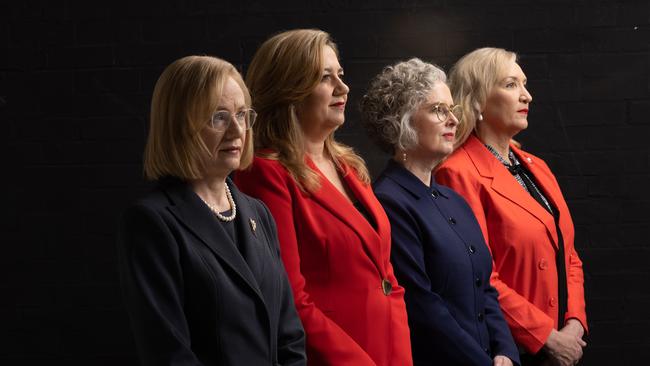
HER EXCELLENCY THE HONOURABLE DR JEANNETTE YOUNG, 59
GOVERNOR OF QUEENSLAND SINCE NOVEMBER 2021
What’s your Queensland story?
My very first memory of Queensland is coming here for Expo ’88. I was a junior doctor in Sydney at the time, and I just thought it was magic, the most amazing celebration. Later on I came up to Rockhampton in December 1994, and I thought it was pretty special. I was a single mum, my daughter Rebecca was four years old and we went on a great adventure together. We went to Great Keppel Island and it was so beautiful. We spent four years in Rocky where I was the executive director of medical services at the Rockhampton Hospital, and it was a very special time. The people of Rockhampton were brilliant, they made us feel so welcome, and they treated us as a pair. If I was asked somewhere, Rebecca was asked also. When I looked at my next step, it was very easy to decide to stay in Queensland and move to Brisbane.
What’s your quintessential Queensland moment?
Watching the sunrise over Point Cartwright at Mooloolaba. It’s so spectacular, where else in the world could you see something as wonderful?
Describe your perfect Queensland day.
If I had a magic carpet, I would go for a walk in one of our brilliant national parks, followed by a meal of Queensland seafood fresh off a trawler, then it would be off to QPAC for a show, they have such wonderful shows there be it the ballet or a symphony or an opera.
What do you see as the challenges ahead?
I think we have a fantastic future and are going in a great direction, but there are still inequities across our state. I believe the best way to counter this is through education. Our education system is good, but everyone needs to be able to access it easily; everyone in our state must have access to the best education they can receive, and we have to work at removing any barriers towards this.
Queensland currently has a female Governor, Premier, Chief Justice and Police Commissioner. This is unique in Australia and possibly the world. How does that make you feel?
Oh, extremely proud to be part of it, but also remember this hasn’t happened by accident. We are travelling in the footsteps of other Queensland women. Look at Anna Bligh, Leneen Forde, Dame Quentin Bryce, we had the most brilliant women to pave the way, and then look at our current Premier, and her path to where she is. There are plenty of examples here of outstanding women.
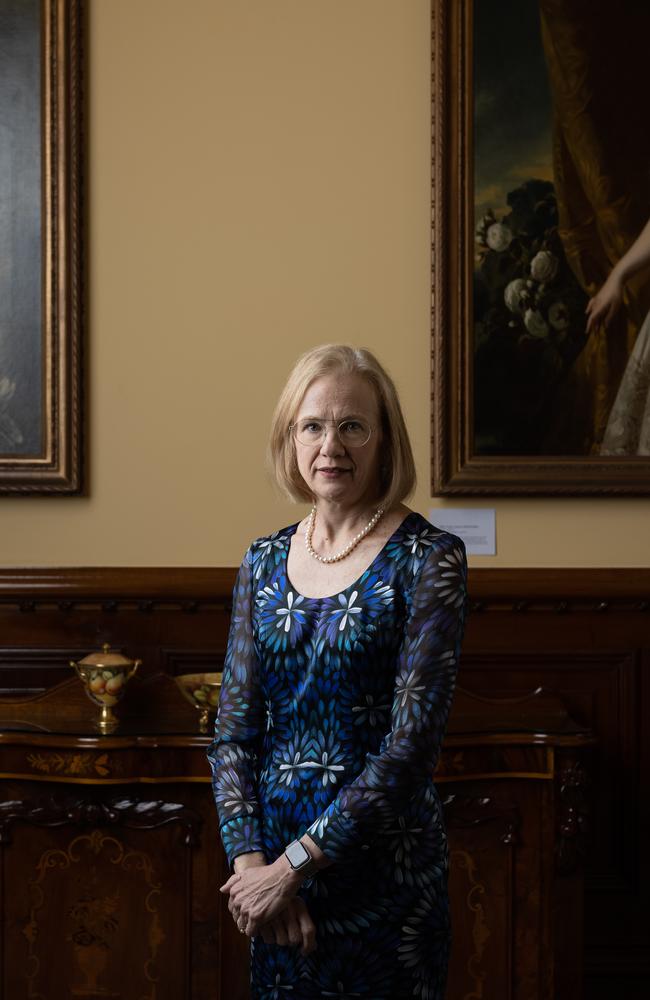
Just a couple of decades ago this would have been unheard of, Queensland was very conservative, and women were largely kept to traditional roles. What do you think changed?
I actually think it was the progressive men in Queensland who did it, the ones who mentored those women, because we needed men to step up and commit to this, not just as tokenism.
Men like (former Queensland premier) Wayne Goss, who appointed the first female governor. Or Peter Beattie, who made it very clear he was mentoring Anna Bligh, and was responsible for appointing Dame Quentin as Governor of Queensland. He was critical for me becoming the chief health officer.
What barriers have you had to push through to succeed as a female leader?
Childcare! Until I had my first child, I didn’t see what the fuss was, but gee whiz, when you have a child and you’re trying to have a career it becomes impossible without access to affordable, flexible and good quality care. It is so hard, and it really influenced my career. It’s still tough and I genuinely believe childcare is still the biggest barrier women face because women largely still take on and are the primary caregivers.
What do women bring to leadership roles that may be different to male leadership?
I think leadership teams need a diverse mix of both men and women because I think each has their own skill sets. Women, I think, in the main are more collaborative, although there are always exceptions. But women do talk things through more in general and sometimes that’s very valuable.
Do you ever reflect on how far women have come in Queensland, and your part in this?
I’ve done so a little bit more recently because (as Governor) I am asked to speak to different groups, and it is when women come up to me and tell me that their daughters look up to me that I feel very happy to be a part of this.
Speaking now to young Queensland women, what would you say to them about their future?
First and foremost, it’s exciting, they should be very excited about their future here because there’s so much opportunity. I would say to find their passion and explore it, and always maintain a link to the workforce. Take the time out you need for whatever reason, but keep a link to work, because it can be really hard to re-establish yourself. Also, take the opportunities offered to you; I did and I’m so glad I did.
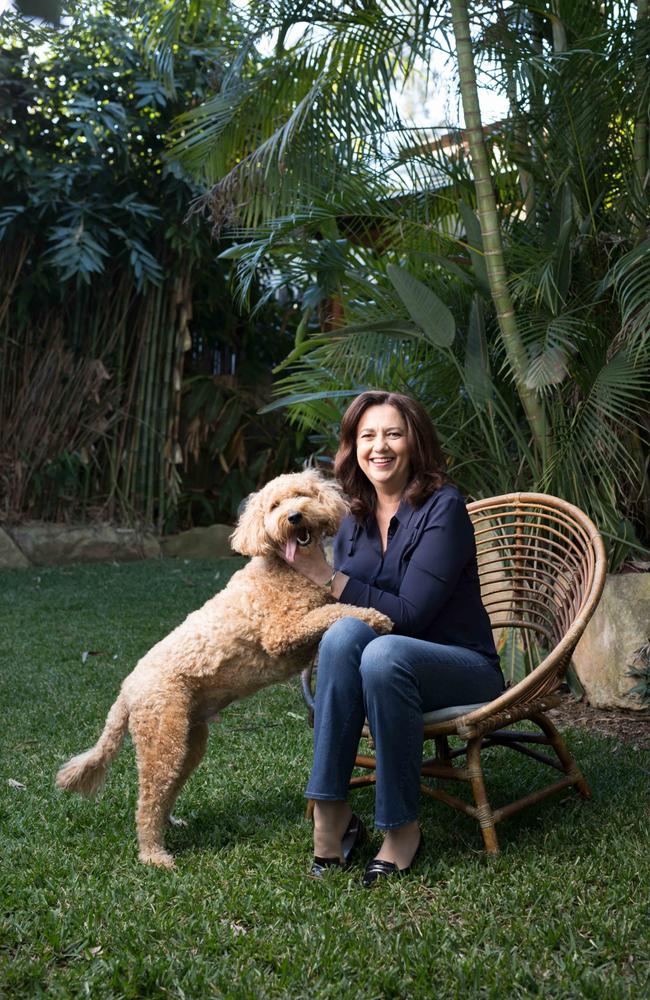
THE HONOURABLE ANNASTACIA PALASZCZUK, 52
PREMIER OF QUEENSLAND SINCE FEBRUARY 2015
What’s your Queensland story?
I was born in Corinda, Brisbane. My mum’s mum was a dressmaker at Oxley and I have fond memories of spending weekends at her big, timber Queenslander. As kids we played in the yard, always outside, in the mandarin and mango trees. I also remember trips to the Big Pineapple, The Spit and Somerset Dam.
What is your quintessential Queensland moment?
My mum and dad and sisters and their families, all of us get together on Minjerribah (North Stradbroke Island), we go surfing at Cylinder Beach and walking at the Gorge. We also like the Scenic Rim and have a lot of family celebrations on farms and properties there.
Sometimes you will find me at a fish and chip shop on the Gold Coast, sitting on the tables out the back or at Red Hot Cod at Burleigh Heads.
My partner Reza (Adib) and I love walks on the beach. I love Smithy’s at Longreach. You sit in his boat at night time and with the reflection on the water it’s as though you are surrounded by thousands of stars.
Describe your perfect Queensland day.
Today.
What do you see as the challenges ahead for our state?
We never know what will be thrown at us. Never in my lifetime did I expect to be caught up in a worldwide pandemic. But I think we can all be proud of the way we came through it.
Just in my time as Premier we have faced 65 natural disasters from cyclones to floods and bushfires. If we can get through all of that we can do anything.
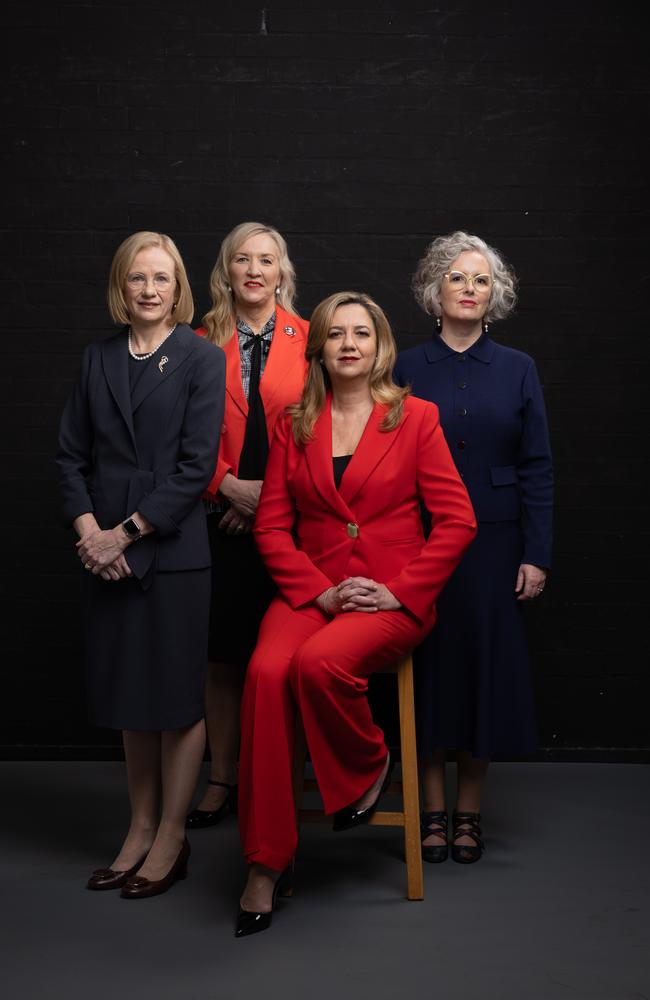
Queensland currently has a female Premier, Governor, Chief Justice and Police Commissioner. How does that make you feel?
Very proud. At the height of the pandemic we had a media conference.
Afterwards I turned to someone in my office and said: “Do you realise we just had a media conference with the Premier, the Chief Health Officer and the Commissioner and all of us are women?” He hadn’t even noticed.
I think that to have so many women in so many key roles and for it to be accepted as unremarkable is an extraordinary achievement. It’s like “this is how it’s supposed to be”.
The head of our public service, my director-general, Rachel Hunter, is a woman. That’s a first too.
Just a couple of decades ago, this would have been unheard of – women were not represented in influential positions. What do you think changed?
Women are 50 per cent of the population. We should be represented.
Now it is accepted but women know this has been hard fought-for.
It is often said that we can’t be what we can’t see and I think that is true. I want young girls and women to grow up thinking “I can pursue any career. I can pursue any dream”.
The more society sees women doing whatever they want to do – whether it is trades or professions or sport – the sillier it seems that it wasn’t always this way.
What barriers have you had to push through to succeed as a female leader?
I was in a fairly senior role in Canberra and the only woman in a room. Someone tried to give me their coffee order. Another time I was the only woman in a meeting and the men asked me to leave while they presumably discussed serious topics.
What do women bring to leadership roles that may be different to male leadership?
Equality in numbers brings equality to the views at the table. Then there are people with disabilities, First Nations, older Australians, younger Australians – everyone has something to offer and everyone should be heard.
Do you ever reflect on how far women have come in Queensland, and your part in this?
I am proud of the choices I have made.
I will never forget the morning Katarina was appointed police commissioner. The first person she rang was her mum.
I can’t imagine navigating the pandemic without Dr Young. Queensland saw us stand shoulder to shoulder dealing with each new crisis as it came.
All of the women I work with reached their positions because they are good at what they do. Some of them are the world’s best.
Did you know that when the first woman was elected to parliament she had to sit
outside to eat her meals? She was not allowed in the dining room. There wasn’t even a bathroom for her.
I like to think Irene Longman (the first woman elected to Queensland parliament in 1919) looks at the makeup of the parliament now and the photograph in this magazine and feels like “finally … about time”.
Of course we are not perfect. But this is Queensland. There’s always a brighter tomorrow.
Speaking now to young women, what would you say to them about their future?
It’s yours. You know that. Take every opportunity that comes your way.
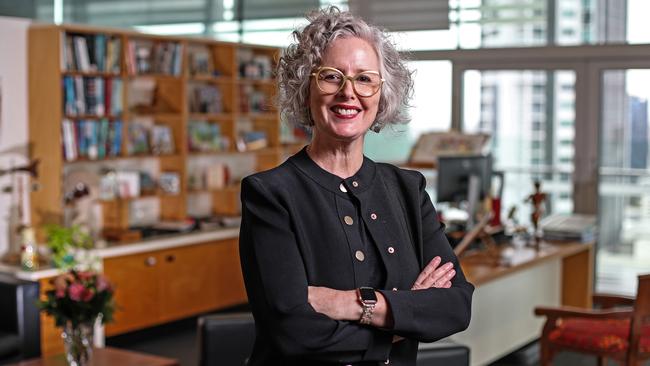
THE HONOURABLE HELEN BOWSKILL, 52
CHIEF JUSTICE OF QUEENSLAND SINCE MARCH 2022
What’s your Queensland story?
I was not born in Queensland. I was born in Benoni, which is near Johannesburg in South Africa. I came to Brisbane just before I turned 10 with my family: my parents and older brother and sister. As we arrived in December, at the start of what I came to know as the long, summer school holidays, and we stayed temporarily in a block of units in East Brisbane which had a swimming pool, my first impression was of a glorious, warm, sunny holiday place.
What’s your quintessential Queensland moment?
It’s hard to pick one, but I think it’s swimming in the sea at Cylinder Beach on Minjerribah, followed by a gelati at the Oceanic Gelati shop, a walk along the Gorge, where on any day you might see a koala or a wallaby on the path, and a manta ray and some dolphins in the water below. Bumping along the inland tracks on K’gari (Fraser Island) on the way to a swim at Lake McKenzie would be another … or maybe I’m just describing my favourite Queensland holiday destinations!
Describe your perfect Queensland day.
It would be a weekend day on which I have no commitments; a hot and sunny day which starts with a long walk along the river to South Bank, and ends with a chilled glass of wine on my back deck listening to the cicadas and birds, enjoying the feeling of calm as the warmth of the day gives way to the coolness of the evening.
What do you see as the challenges ahead for our state?
There are a number of significant challenges – although we are not alone in this. Some of the most significant, I think, are to try to find a way to address the mental health crisis that besets so many in our community, and which is a source of so much misery and hardship; to address the causes of domestic and family violence and abuse; and do more as a community to enable women and girls to feel and be safe. Interlinked with all of those are the fundamental problems within our society caused by drug and alcohol abuse and addiction. The fact that our First Nations people suffer the social problems of our society at a much higher rate than others is also a national tragedy which needs to be addressed.
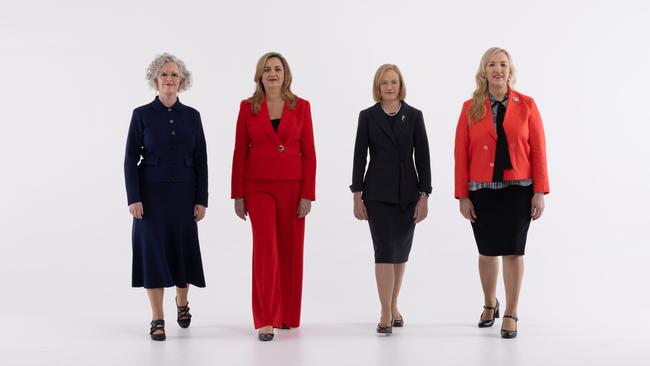
Queensland currently has a female Chief Justice, Governor, Premier and Police Commissioner. How does that make you feel?
I feel very proud of the collective achievement, and honoured to be amongst this impressive group of women. I am also very grateful for those who have blazed the trail before me, and to those women and men who have supported, encouraged and helped me in my career.
Just a couple of decades ago this would have been unheard of. What do you think changed?
Interestingly, Queensland was recently described to me as, at the same time, the most conservative and the most progressive place in Australia. I don’t think there was one thing … it has been a combination of things: some positive action, together with persistence and determination, courage and solidarity. When barriers – real or perceived – present themselves, if you just go ahead and do it anyway, you never know what might happen. The great gift to women of my generation, from the women of earlier generations, was the freedom to assume you could follow whatever career path you might choose and the confidence to try.
What barriers have you had to push through to succeed as a female leader?
Sometimes the main barrier to success is yourself: self-doubt, insecurity, the dreaded “impostor syndrome”, even paralysing perfectionism. But one of the really powerful skills is to turn what you might think is a weakness into a strength.
I was recently reminded, listening to another female leader speak, of the quote from the Stoic philosopher, Marcus Aurelius: “The impediment to action advances action. What stands in the way becomes the way.”
That struck a real chord with me. Identifying those things about yourself that you thought would stand in the way of success, but which, when harnessed, can in fact be great strengths, is very liberating.
In terms of other barriers, though, my peers and I are lucky to have had incredible women in the legal profession, who did the “pushing” before us. These include Agnes McWhinney, the first woman admitted as a solicitor in Queensland, in 1915; Una Prentice, the first woman admitted as a barrister in this state, in 1938; and Naida Haxton, the first woman to practice as a barrister in Queensland. In more contemporary times, they include Chief Justice Susan Kiefel of the High Court of Australia; Margaret McMurdo, the former president of the Court of Appeal; and Catherine Holmes, my recent predecessor – and many others. I never felt as though I was pushing barriers or roadblocks. Perhaps they were there, and I was not aware of them. But I just did what I did, and worked hard, and opportunities arose, sometimes unexpected ones. I was also the beneficiary of people further up the ladder putting their hands down to help me up, which is so important.
What do women bring to leadership roles that may be different to male leadership?
I think the strengths that people bring to their role as leaders is more about who they are, than necessarily about gender. What all organisations benefit from is diversity within the composition of it, at every level. To me the strengths of a good leader – regardless of gender – include a willingness to engage with and listen to people; to be creative and open to new ideas; to be organised and decisive; and to have some kind of vision, or bigger picture in mind.
Do you ever reflect on how far women have come in Queensland, and your part in this?
Yes, although not so much about me having a part in it. You don’t have to go too far into history to find things that were very different: where women were not permitted to do certain jobs; or were required to leave if they got married or got pregnant. So to me, to have had the freedom to study and work and have a career and a family without worrying about the fact that I’m a woman is fantastic but also something I’ve probably taken for granted. That in itself is an indication of how far we’ve come.
Speaking now to young Queensland women, what would you say to them about their future?
The main thing I would say to young Queensland women, and men, is don’t panic. There seems to be so much pressure on young people now – to know what they want to do, which path they want to take. That is really hard when you’re just leaving school. Don’t panic if you have no idea – something will emerge later on. Whatever path you choose to take, have the courage to be your authentic self. Be open to ideas and opportunities because you never know where they will take you.
Stand up for yourself and don’t settle for things that do not seem right or fair, whether that is in personal relationships or work arrangements. I see great individual courage in young people, who have the strength of conviction to stand up for what they believe and call out things that are wrong or unjust.
In life there will always be hurdles, but I’d like to think that a bright future awaits young Queenslanders, with equal opportunities, respectful relationships and workplaces, as well as great fun to be had in this beautiful state.
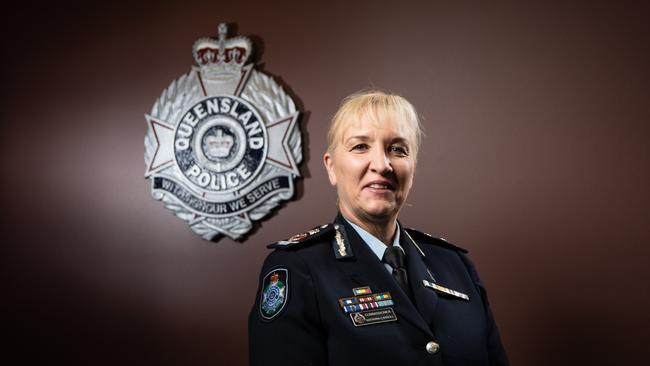
KATARINA CARROLL, 58
COMMISSIONER OF QUEENSLAND POLICE SINCE JULY 2019
What’s your Queensland story?
I was born in Innisfail in Far North Queensland, to my parents who were Croatian immigrants. I was raised on a tobacco farm, where my siblings and I spent a lot of time working in the fields with our parents. My childhood epitomised a rural Queensland lifestyle – lots of freedom and independence. While we worked hard helping my parents on the farm, my youth was wonderful and full of fun. I was driving tractors, cars and motorbikes from a very young age and spent endless hours outside.
We also worked and lived with people from so many backgrounds – Croatians, Italians, Indians, First Nations and the list goes on. My parents embraced everyone and treated them with respect and fairness – that is how we were raised. That is a true Queenslander to me.
I truly had a fantastic upbringing and loved growing up in this state. Obviously, it left a lasting impression, as I have stayed in Queensland and raised my own family here. While I am now in Brisbane, I have been drawn back to Far North Queensland many times and still relish any chance I get to travel there.
What’s your quintessential Queensland moment?
I am a crazy sporting fanatic, so I do love supporting and seeing my Brisbane and Queensland teams play. We get to enjoy so many sports here – cricket, rugby league, Aussie rules, netball and tennis, to name a few.
I would also have to say that being outdoors and walking on the beach, enjoying fish and chips with my family, is another quintessential Queensland moment.
Describe your perfect Queensland day.
Every day is perfect in Queensland, but the extra-special days are when the sun is shining brightly and I’m headed down the coast with my family. Those days I enjoy walking on the beach, watching the waves roll in from the balcony and enjoying a crisp white wine and seeing the world go by. It is the perfect way to unwind after busy work weeks. Queensland truly has the best beaches in the world!
What is your favourite thing about Queensland?
The people in Queensland make this amazing state what it is. Being the Police Commissioner and having spent decades in the Service, I have seen countless emergencies, disasters and tragedies. But what makes this an incredible place is seeing how people here rally around each other in times of need. It truly makes me proud to be a Queenslander.
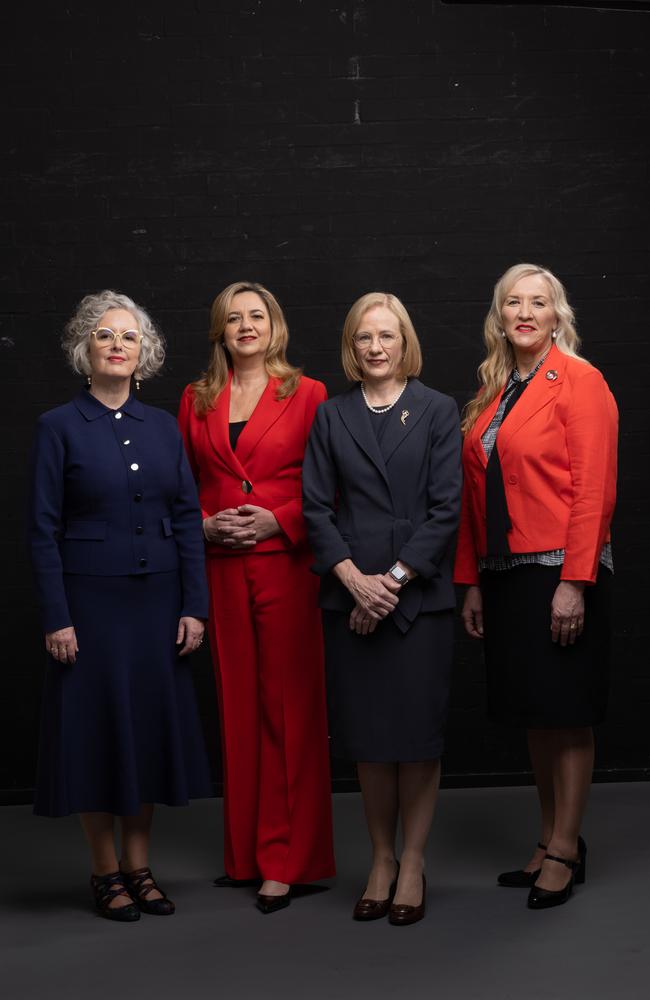
What do you see as the challenges ahead for our state?
Queensland has just come away from one of the most difficult periods in recent times. Now, adjusting to “living with Covid”, I think we can focus on some of the other challenges. Natural disasters are a huge challenge – what we have seen in recent years are some incredibly significant disasters, from floods and cyclones to bushfires. We are always working to ensure Queenslanders are prepared for whatever disaster Mother Nature may throw at us.
We will also turn our attention to getting ready for the Brisbane 2032 Olympic and Paralympic Games. After my experience with G20 and the Commonwealth Games, I can imagine how much work is going to be involved and it will really have a big impact on people in the southeast with some amazing legacies.
Queensland currently has a female Police Commissioner, Governor, Premier and Chief Justice. How does that make you feel?
It is fantastic to be surrounded by so many incredible and inspiring female leaders. Even when I started my career, women were pigeonholed into certain roles, and being a police officer was not a traditional role for a female. You might have been pushed into “stereotyped” roles like nursing or teaching. And while these are important careers, it is so crucial that women have equal opportunity to choose whatever they want to do in life.
I also know it means so much to young women everywhere to have successful female leaders to look up to. Some of these leaders in our state are absolute trailblazers, proving you can do whatever you set your mind to.
Just a couple of decades ago this would have been unheard of. What do you think changed?
I truly think society had to change. Women have so much to offer, and just within our Service I have seen how our women have made an incredible impact over the decades. When I joined the QPS, only 4 per cent of the organisation was women. We now have close to 30 per cent women in the organisation and a third of our executive leadership team are women. This is a dramatic and positive shift.
And while a lot has changed, even in my lifetime, what I would like to see is more change and equality for women.
What barriers have you had to push through to succeed as a female leader?
There were many barriers when I became a police officer in what was a very masculine and hierarchical organisation. The barriers and comments that really stood out early in my career were when senior men would tell me women should not be in the service. In fact, we were told it was not our place and we were taking the places of good men.
I worked and studied hard all my career, and stuck to my own values, to be able to prove I was a capable officer. And it took even more work to prove myself as a leader. But it certainly was not all harsh treatment and there were some exceptional male mentors (as there were very few senior women) who gave me opportunities and believed in me. I am where I am because of good men and my husband has played a big part in that.
What do women bring to leadership roles that may be different to male leadership?
I do believe women can lead differently and bring a sense of compassion, openness and transparency to leadership roles. Obviously, every leader is different and has a varied style of leadership, but the women I have led alongside in the QPS show genuine care for the people they are leading.
I also think women are extremely resilient as leaders. That includes not only leading at work, but the evidence clearly shows women still carry most of the home duties. These responsibilities over the decades has added to the strength and resilience of women. Also, having to spend a lot of your early career proving people wrong, whilst it can be exhausting, definitely instils a unique resilience as a leader.
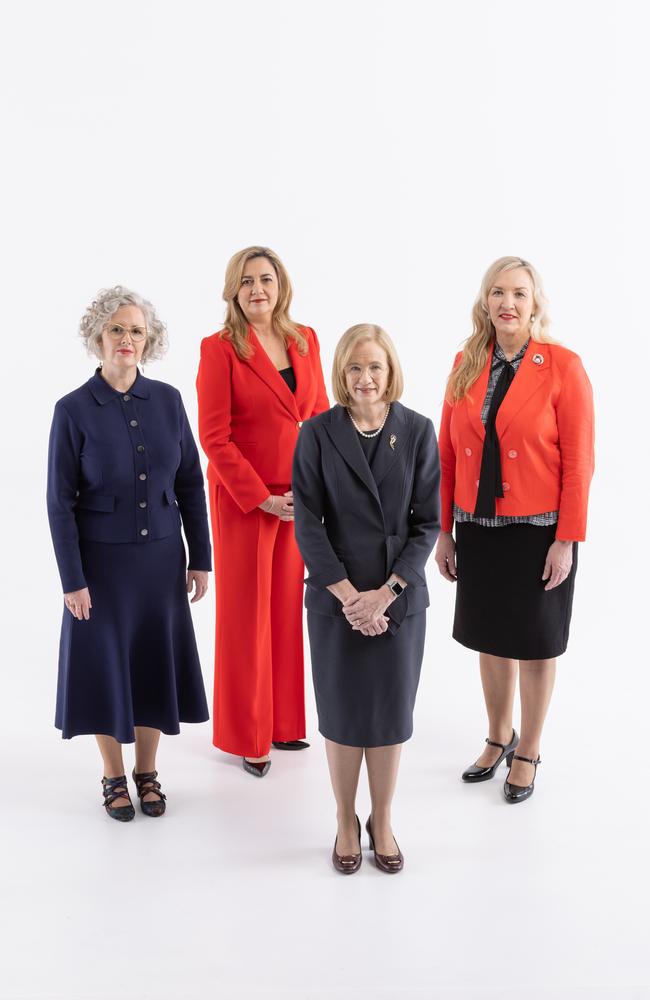
Do you ever reflect on how far women have come in Queensland, and your part in this?
It is now very visible and the evidence is very clear that we have come a long way – further than many other states and countries. Having women in senior leadership roles gives hope to women and encourages others to strive for the same goals. I think it is incredible for young women in Queensland to see so many females in top leadership roles and know that they can follow the same path. I rarely reflect on the part I may have played in this, but when I do, I think it is pretty awesome.
Speaking now to young women, what would you say to them about their future?
Young women starting their careers should dream big and pursue their dreams fearlessly. We are lucky enough to live in a state where you can go out and chase opportunities.
I would say work hard for what you want to achieve. I truly believe in Queensland we are lucky enough to be able to chase our dreams.
And of course, I would say consider a career with the Queensland Police!
More Coverage
Originally published as ‘I was the only woman so I was given the coffee order’: Qld’s top women speak out




